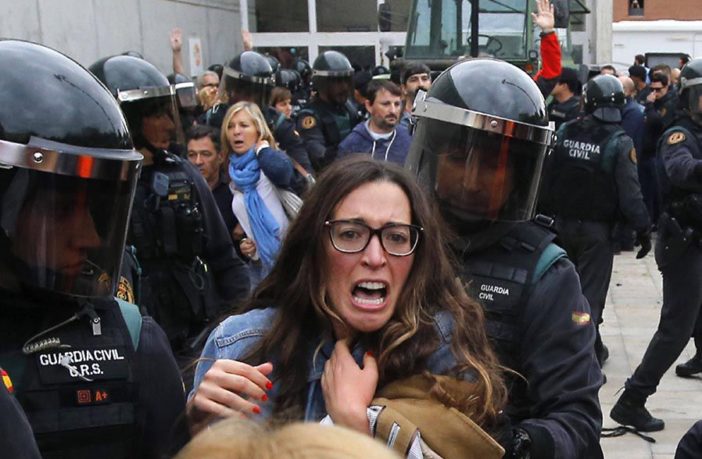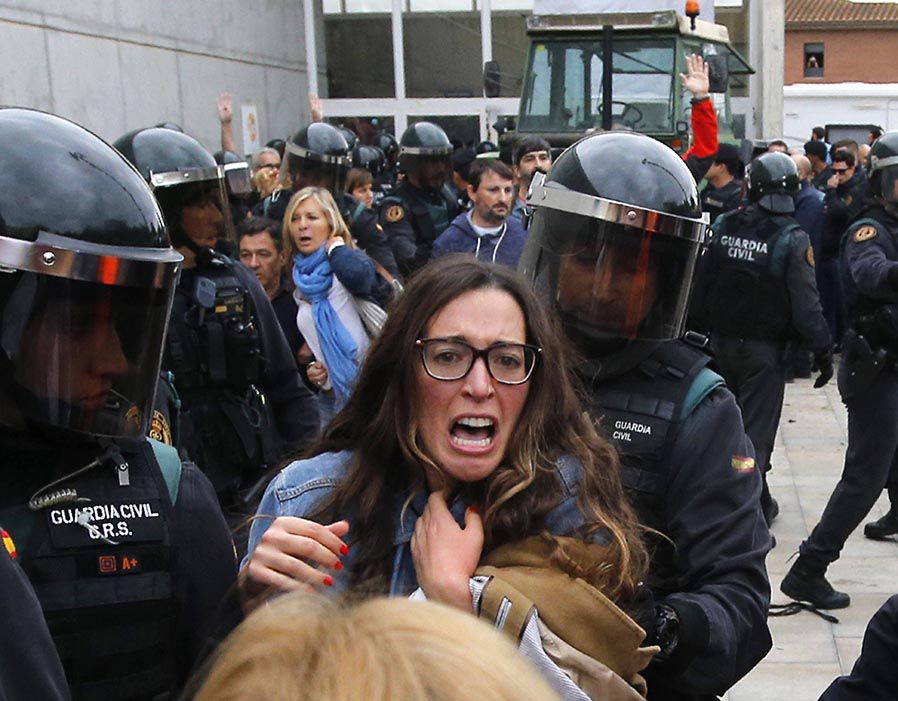Al Bawaba
An independence referendum in a region of Spain was violently resisted by police on Sunday.
This gave rise to comparisons with events in the Middle East.
This is Spain’s Arab Spring, some claimed.
Perhaps, however, a comparison to Kurdistan’s recent referendum is more appropriate.
Footage of women being dragged by their hair from polling stations, pictures of hundreds of injured with bloodied heads and headlines decrying a “violent police crackdown”.
These are not scenes from an oppressive dictatorship but rather from the heart of the E.U., in “democratic Spain”.
The Catalonia region descended into violence yesterday, as government forces attempted to forcefully prevent the banned referendum on independence.
And, as far as the Prime Minister Mariano Rajoy is concerned, they succeeded. Rajoy has declared that “there was no independence referendum in Catalonia today.”
That point would be contested by the 90 percent of Catalan voters who said “yes” to independence.
Still, this result should be taken with a pinch of salt: the vote was chaotic and, with a 42 percent turnout, unlikely to be representative.
Many have taken to social media to compare the events, somewhat unfavorably, to what might be expected in parts of the Middle East.
In particular, European Union leaders, often quick to condemn oppressive actions in the Middle East, have been criticized for their muted response to Sunday’s brutality.
Emphasis has also been placed on apparent parallels with the “Arab Spring” protests that sparked uprisings in Tunisia, Egypt, Syria and elsewhere over six years ago.
— Emily-Rose Frank (@emilyrosefrankT)
— Dan Williams (@dan63uk)
— Tinashe (@benevolence1991)
— Yasmina (@animsche)
It is undeniable that the state brutality shown yesterday in Spain catapulted the poll into the international spotlight far more than it would have been had it been allowed to go ahead peacefully.
Commentators have emphasized that the dramatic scenes were the best guarantee that even those lcoals previously indifferent to Catalonian nationalism would suddenly take an interest.
There were many moments like this in the Arab Spring and beyond.
When Tunisian street vendor Mohamed Bouazizi set himself alight in response to his abuse at the hands of state officials, it was a turning point. His death was the catalyst for protests beginning in his own nation and spreading across much of the Arab world.
More recently, the horrific images of Moroccan fish vendor Mouhcine Fikri, crushed to death by a garbage truck as he tried to rescue his produce, confiscated by police, launched ongoing protests in the Rif region.
Al-Hirak al-Shaabi movement, which has been brutally repressed by the state, has grown as more protesters are arrested, and as the press continues to be silenced.
Proof, if more was needed, that police violence almost inevitably feeds popular resistance, whether in the Arab world or in Spain.
Independence referendum season
Away from suggestions that this is is Catalonia’s Arab Spring, another comparison is perhaps more relevant.
Spain’s disputed referendum comes only a week after Iraqi Kurdistan’s controversial vote on independence.
While Kurdistan’s referendum, like Catalonia’s, was opposed and rejected by central government, no scenes of police violence emerged in northern Iraq last Sunday.
— Masoud Barzani (@masoud_barzani)
— Yes for Independence (@Yes_Kurdistan)
This should not be taken as evidence of the Baghdad government’s respect for the will of the people, however. Prime Minister Haider al-Abadi made clear before the referendum that Iraq would intervene militarily should the poll turn violent.
Iraq and Turkey, also vehemently opposed to Kurdish independence, carried out a joint military exercise shortly after the vote, in a show of force that should be read as nothing short of a threat.
Why Are Kurds Waving Israeli Flags at Pro-independence Rallies?
Viral Videos Claim to Show Vote Rigging in Kurdistan’s Referendum
There were no bloodied heads or police in riot gear in Irbil or Sulaymaniyah, but the central government soon forced the suspension of international flights from their airports.
The result of the Kurdish referendum could not be closer to Catalonia’s – 92 percent “yes” to the Spanish region’s 90.
The Catalan government has indicated that it would make a unilateral declaration of independence from Spain within 48 hours of a “yes” vote. In that case, central government would have the option of stepping in to impose government control.
Iraqi Kurdistan meanwhile framed its referendum as a precursor to negotiations with Baghdad, which the latter has made clear will not take place.
In Catalonia and Kurdistan, then, any attempt to implement the results of their referenda is likely to lead to violent conflict.
For both regions, gaining independence rests on securing a centrally recognized election, and at the moment that seems like a near impossible task.
— amad (@am96ad)








